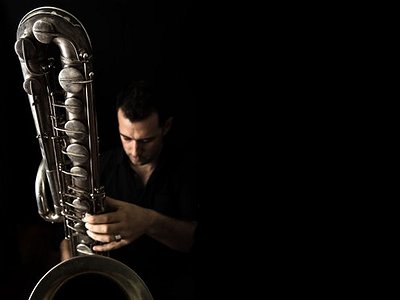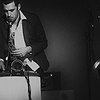Part 1
Name: Jason Sharp
Nationality: Canadian
Occupation: Baritone Saxophonist/ Composer
Current Release: Its A Boat Upon Its Blood
Musical Recommendations: Saxophonist John Butcher has an amazing palette of sounds on the instrument and a thoughtful approach to improvisation that is highly compositional. His use of controlled feedback with saxophone and site specific work takes his command of acoustics into a minimalist electronic territory that I love.
I have also been really enjoying the no input mixer music of Toshimaru Nakamura. It’s fascinating how he can create this wide palette of sounds and use them in such a musical way with no external audio input whatsoever using just feedback patching between mixers. The fragility and peaceful quality present in his music utilizing such a harsh means of producing sound is such a compelling aesthetic to me. It’s also really interesting to be working with such confinement within the electronic realm and I greatly admire the discipline he must have to commit to music making such as this.
Website: If you enjoyed this interview with Jason, you can find more information about him on his website.
When did you start writing/producing music - and what or who were your early passions and influences?
I started playing classical saxophone at 12 yrs old and discovered Jazz later in high school. I didn’t start to write my own music until university and then studied composition in a masters program at the Conservatorium van Amsterdam.
I really went to Amsterdam because I was drawn to the Dutch music scene surrounding Misha Mengelberg, Han Bennink, Ab Baars, and the ICP orchestra. I bought a season pass to the BimHuis and listened to the players in that musical world whenever I could. Their music has this unique mix of absolute freedom within contemporary composition, a deep understanding of both European classical and American jazz traditions, and can be so poignant and then absolutely hilarious all within one piece. That community of players all have such a unique voice and they had a big impact on both my playing and writing at the time.
While in Amsterdam I also spent a lot of time at experimental electronic music shows often held at the Paradiso and was struck by the physical experience as a listener. I remember entering the main room and feeling like I was walking through a tangible mass of sound. I loved how certain frequencies would resonate in my body and the opportunity to immerse myself in the music and make a commitment to that physical experience. I started taking live electronics courses as a result and it exposed me to some of the exciting things people were working on with programs like Max/MSP.
What do you personally consider to be the incisive moments in your artistic work and/or career?
My first solo saxophone performance was opening for the great David S. Ware. It went terribly to be entirely honest. After the concert David was kind enough to spend over an hour with me discussing solo saxophone playing as an on-going practice. It definitely changed the way I practiced my instrument and lead to gaining confidence to fully commit to my own musical ideas.
Secondly I would have to group my collective experiences of playing in Sam Shalabi’s Land of Kush, Nicolas Caloia’s Ratchet Orchestra, and Matana Roberts’ Coin Coin project. These ensembles were all happening with an overlapping timeline and occurred during a period where I was not writing music myself. Each of these bandleaders have such an incredibly strong individual voice as musicians and are unwavering in their commitment. Witnessing how they skilfully chose unique individual voices for their ensembles in order to realize a music that is still so strongly identifiably them was illuminating. When I started to write again I definitely drew on those insightful experiences.
What are currently your main compositional- and production-challenges?
I’ve currently been working on how to translate my ensemble compositional ideas to my solo playing. Playing solo has typically always been a means of checking in with myself and exploring new sound material and less about applying a strict compositional approach. Trying to find ways to communicate certain compositional ideas with a solo voice has been a good exercise in getting to the essence of the ideas themselves and has allowed me to work on my saxophone playing through composition, which has typically been two entirely separate practices for me.
What do you usually start with when working on a new piece?
I always seem to begin with the organization of sound by establishing a specific relationship in the orchestration. Zeroing in on a particular palette of textures tends to guide the decision-making process, from there I can develop a piece within a unique sonic world.
How strictly do you separate improvising and composing?
They are intrinsically linked but can be defined as two very separate processes occurring at two entirely different times. Improvisation is a first response to organizing timbre, dynamics, harmony, rhythm, form etc. and is typically influenced by exterior factors. Composing is the same decision-making process but isolated and slowed down allowing you to make calculated decisions to enable musical moments to occur at a later time. The response to these compositional ideas can spur on new improvisational-based relationships that can lead to new compositional ideas. It’s a constantly developing feedback loop with two distinct speed settings.
I also feel that improvising is a community-building practice while composing is a solitary experience. Most cities with any improvisational music present usually have a series lead by the musicians who are central to the scene or offer other opportunities for collaboration.
Improvising on stage with other musicians builds musical connections, nurtures an evolving music scene, and provides an opportunity to dip into a creative well that could be the springboard for new ensembles to write for. Almost every established group I have written for or been a part of I have also performed with the players involved in a strictly improvisational setting. Getting to know people through this vehicle informs how to write music that highlights their original voice enabling a unique musical aesthetic for the ensemble.
How do you see the relationship between sound, space and composition?
When writing any music, the physical space it will be performed in is always in the back of my mind and inherently affects the music from the earliest point of conception. If I am composing for a group that I know is going to be performing in an art gallery I am immediately thinking of a certain size of sonic distribution to effectively resonate that space. If electronics are involved I would probably utilize smaller speakers and acoustic instruments would be unamplified. These choices absolutely shape the decision-making process in composition.
If I know that the music is going to be presented in a larger room with the use of a sizeable PA, I conceive of the music with the PA in mind as an additional instrument. The usage of a sub woofer allows you consider music as sound that is felt rather than heard. Microphone placements and mixing choices become integral compositional elements. The space often dictates the sound choices that in part dictate the compositional choices. Being sensitive to that relationship can enable the music to continue to evolve as a living thing.
Do you feel it important that an audience is able to deduct the processes and ideas behind a work purely on the basis of the music? If so, how do you make them transparent?
The importance fluctuates piece to piece. Having done several performances with amplified heartbeat, I know for a fact that the audience response is dramatically different if they are aware that the central musical element they are listening to is a real time heartbeat. No matter how transparent I feel the ideas are behind that experience it doesn’t always translate to everyone and in some ways I feel the audience members who are not privy to the process or ideas behind the work have been left out of an experience.
As another example, I just played in Zagreb for the 25FPS film festival where the artist in residence was Bruce McClure. Bruce makes incredible industrial soundtracks for his projections by the exclusive use of capturing and manipulating the sounds of the projectors he uses for the image. Being aware of that process and the idea behind the relationship between the image and sound, made the experience as a listener entirely different. I was fascinated by how he was achieving rhythms and textures in the music and that became such an engaging part of my experience as an audience member.
Programs or liner notes can be beneficial to best prepare an audience for fully experiencing works but they can also establish preconceived notions that may result in some measure or valuation of the work which detracts from experiencing it with openness. In other pieces the process or the ideas behind the work may be inconsequential to the listening experience and are best taken in at face value. There is an excitement in listening to something with no expectations or predetermined judgement and discovering connections to it.
No matter what the work is, I think it's always important to strive to bring as much clarity to the ideas as possible and that’s all you can really do. Dealing with sound you are already in a very abstract world, so to connect the audience with an idea that translates requires a great deal of clarity. Often limiting one's self to stay as close to the essence of an idea as possible can lead to stronger work and a more impactful listening experience.






